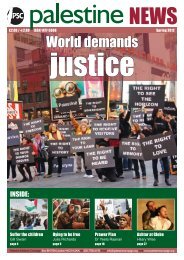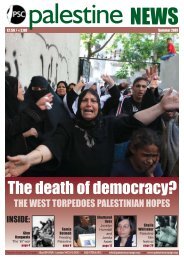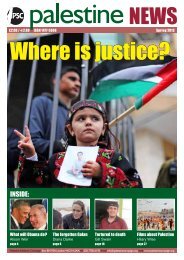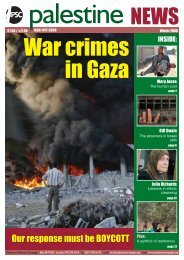28 palestine news ARTS & REVIEWSspring2011Surveillance and Control inIsrael/<strong>Palestine</strong>: population,territory and powerEdited by Elia Zurick, David Lyon andYasmeen Abu-LabanPublished by RoutledgeWay, way back I was joint author ofa Penguin book, The Technologyof Political Control. Its theme washow technologies were beingdeveloped in the UK to protect the statefrom attacks from within. The context wasthe “troubles” in Northern Ireland.So I jumped at the chance to review abook covering at least part of the sameterritory but now with Israel’s attempt tocontrol <strong>Palestine</strong> and Palestinians as thefocus and with technology advanced by 35years. Back then plastic bullets were cuttingedge. Now we have the Unmanned AerialVehicle (UAV) or drone.The drone is indeed the iconic newdevelopment in warfare and not just inIsrael. But it is Israel that makes 68% of theworld-wide market. Israeli UAVs monitorthe India/Pakistan border and are in use inThailand, the Philippines, Malaysia, the USborder with Mexico… and the UK is buyingthem too. This is just one instance of alarger phenomenon: Israel was ranked bySIPRI in 2008 as the sixth largest militaryexporter in the world. Other sources put itfifth or even third.It is not just hardwarebut also military doctrinethat is exported fromIsrael. Those US targetedassassinations by dronein Afghanistan. Whopracticed it first? And herewe see another successfor Israel. In deliberatelyand repeatedly breakingwhat were understood tobe the rules of warfare,they are having somesuccess in changingthose rules which areonly conventions.Israel has otherhigh-tech exports —homeland securitytechnologies are already in the$billions including passenger profilingsystems, biometrics, checkpoint systems,intruder detection systems. They all comewith the useful customer reassurance thatthey have been forged and tested in thelaboratory of Israel’s ongoing conflicts.A more mundane aspect of Israel’ssurveillance of its Arab population isfocused on the ID card and the checkpoint.The colour-coded ID card is central to aregime of selective but also essentiallyarbitrary exclusion. One provocative chaptersuggests that the whole apparatus isdesigned not to regulatemovement but simplyto discourage it. Theless they move aroundthe easier it is to forgetabout them.There is muchfascinating historicalmaterial, for exampleon the origins of theIsraeli census. And,this being an academicrather than an agitationalbook, there are extensivesummaries and critiquesof the available theories ofsurveillance.Several words ofwarning are, however,appropriate. Too few ofthe chapters attempt todescribe just what the technologies theyfeature actually do and how they work.And there is a good deal of overlap andhence repetition. It is possible, for instance,to learn the size of the Israeli weaponsindustry, or the colours of ID card jackets,once too often. The price (£85) suggeststhat the publishers expect their sales tocome almost exclusively from libraries.Probably they are right.Jonathan RosenheadBDS – The Global Strugglefor Palestinian RightsBy Omar BarghoutiHaymarket BooksOur South Africa moment hasfinally arrived!” concludesOmar Barghouti, transforming anegative concept into a harbingerof victory against Israeli apartheid. Thisis a must-have handbook, especially fornew activists, based on his collectedessays, lectures and articles highlightingthe 2004 call by PACBI (Palestinian<strong>Campaign</strong> for the Academic andCultural Boycott of Israel) and the2005 call for BDS by the PalestinianCivil Society Boycott, Divestment andSanctions <strong>Campaign</strong> which he cofounded.Of course, concerned individualswere shunning Israel well before 2001when PSC formally launched its boycottcampaign. It took years of regular, localbranch organising to make the boycottvisible as a movement in the UK andeven longer before it could be describedas global.Incidentally, author Iain Banks wasamong the first to help PSC promotethe boycott. He did not only “recentlyendorse” it as stated in the book. Andin 2002, as acknowledged, Hilary andSteven Rose initiated a petition callingfor an academic and cultural boycott.“Think global, actlocal,” was our adoptedmantra. The global aspectreceived a boost when170 Palestinian civilsociety organisationssigned up to the BDScampaign.Barghouti writes:“The heart of the BDScall is not the diverseboycotting acts it urgesbut this rights-basedapproach that addressesthe three basic rightscorresponding tothe main segmentsof the Palestinianpeople. Ending Israel’soccupation, ending itsapartheid and ending its denial of the rightof refugees to return together constitute theminimal requirements for justice and therealisation of the inalienable right to selfdetermination.”These principles are applicable toall forms of popular resistance to Israeliapartheid yet there is a focus here thatsometimes makes it appear that BDS is thestruggle, rather than a tactic.By taking ownership of BDS, Palestiniancivil society has exercised self-determinationwhile acknowledging that those whowill implement their calls for boycott areinternational grassroots solidarity activists.It is the responsibility of civil society,human rights defendersand solidarityorganisations globallyto operate BDSwherever we are tothe maximum of ourability and resources.Use this book to spreadit, explain it, advocateit, educate about it!We have a particularresponsibility to respondto the BDS call due tothe historic betrayalof the Palestiniansby successive Britishgovernments.Diane Langford“It is theresponsibility ofcivil society, humanrights defendersand solidarityorganisations globallyto operate BDS”
spring2011 arts & reviewspalestine news 29Journeys of the mindPowerfully affecting,” “a one-sided rant,” “brilliant, edge-of-thesofadrama,” “anti-semitic,” “should be compulsory viewing”:the comments about The Promise are still flooding ontothe internet. When Peter Kosminsky’s gripping drama wasscreened in February by Channel 4 it aroused more controversy —and inspired more dazzling reviews — than any TV drama in recentyears.Essentially it moves between the events leading up to thePalestinian Nakba in 1948 and current events in Israel and theOccupied Territories. The story is told through the eyes of Len, ayoung British sergeant posted to <strong>Palestine</strong> after assisting in theliberation of Belsen at the end of World War II, and through hisgranddaughter, Erin, who has discovered his diaries. Her trip toIsrael with her best friend, who is Israeli and has been called upto serve in the IDF, turns into an increasingly obsessive mission tocontact a Palestinian family Len befriended.Every key angle is covered. In Len’s story we see desperateJewish refugees fleeing the nightmare of the holocaust; ruthlessIrgun guerrillas; Len’s Jewish girlfriend who acts as an informer forthem; the kidnapping, torture, hanging and blowing up of Britishsoldiers; the massacre of Deir Yassin; the Palestinian family whobelieve that they will soon return to their home.“Erin’s physical and mental journeyparallels that of many outsiders whostart from a position of ignoranceand who are shocked and tested bythe reality they encounter”In Erin’s story we see her friend Eliza’s well-meaning “softZionist” parents; their peace activist son, disillusioned andpoliticised after serving in Hebron; his Palestinian friend who actsas Erin’s guide in the Occupied Territories; violent settlers, complicitIsraeli soldiers, suicide bombings, the siege of Gaza...Somehow Kosminsky has managed to weld all these elementsinto a hugely powerful and involving drama. Both Len and ErinErin (Clare Foy) discovers the WallPeter Kosminsky (right) on location with Mohammed (AliSuliman) and Len (Christian Cooke)go on a physical and mental journey of discovery and deepeningunderstanding — hers parallels that of many outsiders who startfrom a position of ignorance and who are shocked and tested by thereality they encounter.At a packed meeting at the Royal Television Society on 16 March,Kosminsky explained how the original idea was triggered by a letterfrom a British veteran telling of his experiences in <strong>Palestine</strong> after thewar and how he and his comrades felt forgotten and betrayed.Kosminsky’s researcher, Helen Barton, delved into the archives ofthe period and interviewed as many surviving veterans as possible— Len’s experiences and reactions are a distillation of this research.The idea of running Erin’s story alongside her grandfather’semerged as Kosminsky came across parallels between events inBritish-mandated <strong>Palestine</strong> and the present day, such as the Britishdynamiting the homes of Zionist terrorists and the IDF bulldozingthe homes of suicide bombers.Kosminsky said he approached the whole issue with absolutelyno agenda beyond turning his research into watchable drama.For instance, Len’s feelings shift from sympathy with the Jewishrefugees to antipathy as Zionist guerrillas target British soldiers, thento sympathy with the indigenous Palestinians whose likely fate wasbecoming increasingly clear. In this he simply mirrors the changingemotions reported by the veterans.No doubt aware of the likely impact of his work, Kosminskycarried out an immense amount of research himself, spendingmonths reading respected modern Israeli historians, and a team oflawyers vetted the accuracy of all the facts referred to in the film. Hesaid he was taken aback by the “highly intemperate” language usedby some viewers who simply would not accept that Israel couldbehave in the way described.He talked about the challenges of filming on location — virtuallythe whole film was made in Israel with Jewish and Palestinian Israeliactors — and he paid tribute to the professionalism of his Israelifilm crew and cast. He said: “There was a scene where a Jewishactress plays a Jewish settler, who has a screaming match with aPalestinian woman played by an Israeli Arab. It was a very hostilescene, it felt tense. At the end they wanted to be photographedtogether as actors.”Hilary Wise• The Promise is available on DVD from Play.com or Amazon







